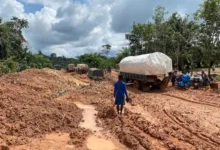Humanitarian assistance, disaster relief shareholders undergo training in Accra

A training programme aimed at ensuring coordination and mutual understanding between civilians, military and police actors in humanitarian assistance and disaster relief is underway in Accra.
Dubbed, Humanitarian Assistance in West Africa Core Course, the two-week exercise is being organised by the Kofi Annan International Peacekeeping Training Centre (KAIPTC) in collaboration with the Austrian Study Centre for Peace and Conflict Resolution.
The joint course has participants from national and international civilians, police and military actors.
It seeks to contribute to several strategic objectives of the Economic Community of West African States (ECOWAS) humanitarian policy and action plan through capacity building and awareness creation.
Speaking at the opening ceremony yesterday, Commandant of KAIPTC, Major General Francis Ofori said, the two-week exercise would be used to discuss some of the hurdles to peace and development West Africa was confronted with.
This, according to him, would enable them explore the grand variety of means and opportunities to meet the increasing number of inter-connected and transnational challenges.
“Our population is particularly vulnerable to the effects of widespread food insecurity, recurrent natural disasters, climate change, the global economic crisis and socio-political instability,”he stated.
Major General Ofori indicated that, the course which now runs for the seventh time would cover an array of topics from the root causes of disasters to the protection of civilians and human rights standards as well as cultural awareness during work.
“To ensure that this course will help to foster human capacities, institutional interaction and civil-military cooperation, we are proud to introduce a team of international and regional facilitators,comprised of very experienced practitioners to share a summary of their best practices, lessons learned and experience gained in the field,” he added.
Eric Nana Agyeman Prempeh, Director of the National Disaster Management Organisation (NADMO) said, lack of legislation in most countries in the sub region poses a big challenge for humanitarian aid and response.
According to him,until Ghana and Nigeria recently took the lead in developing disaster management plans and contingency plans supported by legislation, humanitarian response had been reactive,episodic and lacked national procedures.
Mr Agyeman-Prempeh stated that, currently in most African countries, it had been difficult to coordinate emergency and crises response effort due to turf war between agencies that should otherwise be co-operating with each other.
This, he said, most often led to duplication of efforts, lack of judicious use of scarce resources and sometimes, the uneven deployment of resources in affected communities.
Mr Agyeman-Prempeh mentioned poor infrastructure, lack of funds,centralisation of resources and extreme poverty as other challenges for humanitarian aid and response.
He indicated that,weak economies made it difficult for governments to devote adequate funds for developing resilient communities,feasible plans and prepare appropriately to react to emergency situations hence,there was the need for reliable funding to humanitarian agencies.
“There may be plans,but these plans are not feasible because the necessary resources and logistics to back the plans are not available,” Mr Agyeman-Prempeh noted.
He reiterated the need for ECOWAS to reinforce its role and mandate in humanitarian response and coordination in the sub-region by setting up dedicated funds for management of emergencies at the strategic level through the development of strategies, priorities and shared goals.
Mr Agyeman-Prempeh recommended a standby and well-resourced sub regional emergency team capable of responding timely and efficiently when required to help mitigate the impact of emergencies.
BY CLAUDE NYARKO ADAMS







